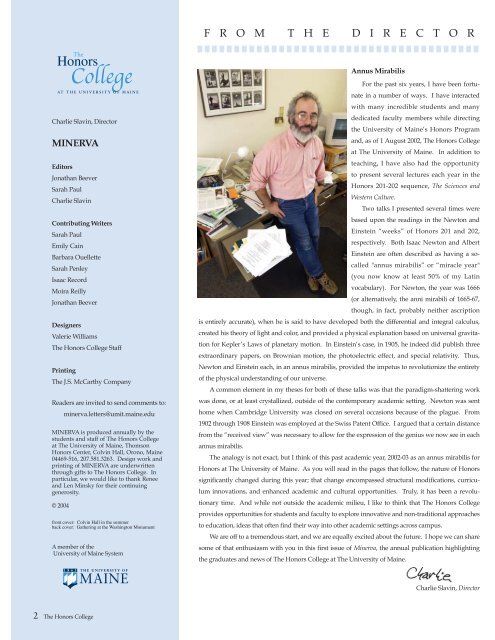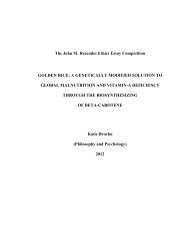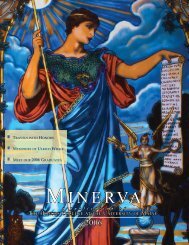MINERVA - Honors College - University of Maine
MINERVA - Honors College - University of Maine
MINERVA - Honors College - University of Maine
Create successful ePaper yourself
Turn your PDF publications into a flip-book with our unique Google optimized e-Paper software.
Charlie Slavin, Director<br />
<strong>MINERVA</strong><br />
Editors<br />
Jonathan Beever<br />
Sarah Paul<br />
Charlie Slavin<br />
Contributing Writers<br />
Sarah Paul<br />
Emily Cain<br />
Barbara Ouellette<br />
Sarah Penley<br />
Isaac Record<br />
Moira Reilly<br />
Jonathan Beever<br />
Designers<br />
Valerie Williams<br />
The <strong>Honors</strong> <strong>College</strong> Staff<br />
Printing<br />
The J.S. McCarthy Company<br />
Readers are invited to send comments to:<br />
minerva.letters@umit.maine.edu<br />
<strong>MINERVA</strong> is produced annually by the<br />
students and staff <strong>of</strong> The <strong>Honors</strong> <strong>College</strong><br />
at The <strong>University</strong> <strong>of</strong> <strong>Maine</strong>, Thomson<br />
<strong>Honors</strong> Center, Colvin Hall, Orono, <strong>Maine</strong><br />
04469-516, 207.581.3263. Design work and<br />
printing <strong>of</strong> <strong>MINERVA</strong> are underwritten<br />
through gifts to The <strong>Honors</strong> <strong>College</strong>. In<br />
particular, we would like to thank Renee<br />
and Len Minsky for their continuing<br />
generosity.<br />
© 2004<br />
front cover: Colvin Hall in the summer<br />
back cover: Gathering at the Washington Monument<br />
A member <strong>of</strong> the<br />
<strong>University</strong> <strong>of</strong> <strong>Maine</strong> System<br />
2 The <strong>Honors</strong> <strong>College</strong><br />
F R O M T H E D I R E C T O R<br />
■ ■ ■ ■ ■ ■ ■ ■ ■ ■ ■ ■ ■ ■ ■ ■ ■ ■ ■ ■ ■ ■ ■ ■ ■ ■ ■ ■ ■ ■ ■ ■ ■ ■ ■ ■ ■ ■<br />
Annus Mirabilis<br />
For the past six years, I have been fortunate<br />
in a number <strong>of</strong> ways. I have interacted<br />
with many incredible students and many<br />
dedicated faculty members while directing<br />
the <strong>University</strong> <strong>of</strong> <strong>Maine</strong>’s <strong>Honors</strong> Program<br />
and, as <strong>of</strong> 1 August 2002, The <strong>Honors</strong> <strong>College</strong><br />
at The <strong>University</strong> <strong>of</strong> <strong>Maine</strong>. In addition to<br />
teaching, I have also had the opportunity<br />
to present several lectures each year in the<br />
<strong>Honors</strong> 201-202 sequence, The Sciences and<br />
Western Culture.<br />
Two talks I presented several times were<br />
based upon the readings in the Newton and<br />
Einstein “weeks” <strong>of</strong> <strong>Honors</strong> 201 and 202,<br />
respectively. Both Isaac Newton and Albert<br />
Einstein are <strong>of</strong>ten described as having a socalled<br />
"annus mirabilis” or “miracle year"<br />
(you now know at least 50% <strong>of</strong> my Latin<br />
vocabulary). For Newton, the year was 1666<br />
(or alternatively, the anni mirabili <strong>of</strong> 1665-67,<br />
though, in fact, probably neither ascription<br />
is entirely accurate), when he is said to have developed both the differential and integral calculus,<br />
created his theory <strong>of</strong> light and color, and provided a physical explanation based on universal gravitation<br />
for Kepler’s Laws <strong>of</strong> planetary motion. In Einstein’s case, in 1905, he indeed did publish three<br />
extraordinary papers, on Brownian motion, the photoelectric effect, and special relativity. Thus,<br />
Newton and Einstein each, in an annus mirabilis, provided the impetus to revolutionize the entirety<br />
<strong>of</strong> the physical understanding <strong>of</strong> our universe.<br />
A common element in my theses for both <strong>of</strong> these talks was that the paradigm-shattering work<br />
was done, or at least crystallized, outside <strong>of</strong> the contemporary academic setting. Newton was sent<br />
home when Cambridge <strong>University</strong> was closed on several occasions because <strong>of</strong> the plague. From<br />
1902 through 1908 Einstein was employed at the Swiss Patent Office. I argued that a certain distance<br />
from the “received view” was necessary to allow for the expression <strong>of</strong> the genius we now see in each<br />
annus mirabilis.<br />
The analogy is not exact, but I think <strong>of</strong> this past academic year, 2002-03 as an annus mirabilis for<br />
<strong>Honors</strong> at The <strong>University</strong> <strong>of</strong> <strong>Maine</strong>. As you will read in the pages that follow, the nature <strong>of</strong> <strong>Honors</strong><br />
significantly changed during this year; that change encompassed structural modifications, curriculum<br />
innovations, and enhanced academic and cultural opportunities. Truly, it has been a revolutionary<br />
time. And while not outside the academic milieu, I like to think that The <strong>Honors</strong> <strong>College</strong><br />
provides opportunities for students and faculty to explore innovative and non-traditional approaches<br />
to education, ideas that <strong>of</strong>ten find their way into other academic settings across campus.<br />
We are <strong>of</strong>f to a tremendous start, and we are equally excited about the future. I hope we can share<br />
some <strong>of</strong> that enthusiasm with you in this first issue <strong>of</strong> Minerva, the annual publication highlighting<br />
the graduates and news <strong>of</strong> The <strong>Honors</strong> <strong>College</strong> at The <strong>University</strong> <strong>of</strong> <strong>Maine</strong>.<br />
Charlie Slavin, Director




